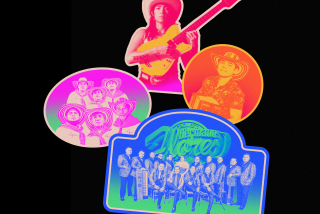Tapping Into <i> Taiko </i> Sources--to Dramatic Effect : Culture: Kenny Endo credits influences from Kabuki theater to jazz in his movements and Japanese-style music.
The sound of one hand clapping is one thing, but the sound of snow falling is entirely another, especially when youâre trying to make that sound with drums.
âI used to work in Kabuki theater, and a lot of my ideas come from sound effects for the stage,â says Kenny Endo, whose taiko ensemble will play two shows tonight in the courtyard of the San Juan Capistrano Regional Library. Taiko are drums ranging from very small, sensitive hand drums to others seven feet high, weighing up to 700 pounds.
âFor the sound of snow, we use a mallet with a rounded padding at the end,â Endo continued. âIt makes a very soft sound, and in the theater it always accompanies tiny pieces of paper fluttering down from the top of the stage. But the sound of snow, the sound of waves, of wind and water and rain--all of these can be used to express much, much more.â
Endo (who will also play free concerts Sunday and Wednesday at California Plaza in downtown Los Angeles) explained how such effects can be used symbolically in Kabuki.
âThe sound of water can mean any kind of stream or body of water in the literal sense. But at the end of a play, you might have two lovers walking off into the distance, and to show that their love is eternal we play the sound of water to suggest that their love is like flowing water. We use the sounds of nature to convey emotions.â
Endo, 41, played classical percussion and jazz-fusion trap drums while growing up in Los Angeles and La Habra. He studied political science and ethnomusicology at UC Santa Cruz and UCLA, then worked with the San Francisco Taiko Dojo. Six months on a Native American reservation--born of a desire to âdo something real and off-campusâ during his stint at Santa Cruz--convinced him to learn more about his own roots.
He moved to Japan intending to stay one year but remained to study taiko for 10. In 1987, he became the first foreigner to earn a natori , or stage name, in classical Japanese drumming, a seemingly subtle honor but actually a profound achievement for a third-generation American. â Natori literally means to receive a name, and itâs an official recognition that youâve achieved a certain level in your art,â explained Endo (whose natori is Mochizuki Tajiro). âIn Japan, the arts include the drumming arts as well as the tea ceremony or flower arranging. Having a natori is also a license to be a teacher. My natori is in the type of drumming you hear in Kabuki theater.â
Endo--who is is completing graduate studies in Hawaii, where he lives with his wife, Chizuko, and their two sons--has performed in Europe, Egypt, Malaysia, Canada, Australia and the former Soviet Union. While Kabuki theater may seem somewhat esoteric to many Westerners, he has found that wherever he goes, people enjoy taiko music.
âGroup taiko is very exciting because thereâs a lot of movement,â he noted. âHitting the drums can be a martial arts-like movement, and in some cases a dance-like movement. What I try to do in my own pieces is to make the music as interesting to listen to as it is to watch.â
*
Kabuki is only one influence on his music. Edo festival music and modern Western music, including jazz, are others. In addition to taiko, he composes music for shamisen and koto (lute-like instruments), shinobue and shakuhachi (bamboo flutes), synthesizer, guitar and saxophone. His ensemble includes Chizuko Nishimura and Kevin Higa on taiko, Masakazu Yoshizawa on bamboo flutes and Noriko Tsuboi on 17-string koto.
If mixing Kabuki drumming and jazz seems a little like serving sushi with hash browns, Endo says that any combination is possible as long as itâs done tastefully.
âI just got back from a tour in Japan with a group of four Hawaiian drummers, each representing a different tradition,â he said. âThere was a Brazilian, an African, an American who plays conga-type drumming, and I represented the Japanese tradition. The four of us did a series of concerts with the Tokyo Symphony, and that combination worked very well.
âItâs like the old Duke Ellington saying--there are only two types of music in the world, good and bad. Categorizing music as jazz or rock or classical, those are simply labels. Rather than being true to any category, the label weâre striving for is quality.â
* The Kenny Endo Taiko Ensemble plays tonight at 7 and 9 in the courtyard of the San Juan Capistrano Regional Library, 31495 El Camino Real. Lawn chairs permitted. $4. (714) 493-1752. The ensemble will play free concerts Sunday at 2 p.m. and Wednesday at noon at California Plaza, 350 S. Grand Ave., Los Angeles. (213) 687-2159.
More to Read
The biggest entertainment stories
Get our big stories about Hollywood, film, television, music, arts, culture and more right in your inbox as soon as they publish.
You may occasionally receive promotional content from the Los Angeles Times.










